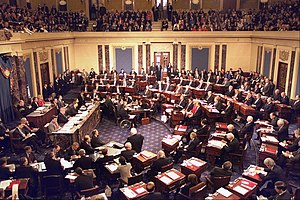The impeachment of Bill Clinton began in December 1998 by the House of Representatives and led to a trial in the Senate for the impeachment of Bill Clinton, the 42nd President of the United States, on two charges, one of perjury and one of obstruction of justice.[1]
| Impeachment of Bill Clinton | |
|---|---|
 Floor proceedings of the U.S. Senate during the trial of President Bill Clinton in 1999, Chief Justice William Rehnquist presiding. House managers are seated beside the quarter-circular tables on the left and the president's personal counsel on the right. | |
| Accused | Bill Clinton, President of the United States |
| Date | December 19, 1998 to February 12, 1999 |
| Outcome | Acquitted by the U.S. Senate, remained in office |
| Charges | Perjury (2), obstruction of justice, abuse of power |
| Congressional votes | |
| Voting in the U.S. House of Representatives | |
| Accusation | Perjury / grand jury |
| Votes in favor | 228 |
| Votes against | 206 |
| Result | Approved |
| Accusation | Perjury / Jones case |
| Votes in favor | 205 |
| Votes against | 229 |
| Result | Rejected |
| Accusation | Obstruction of justice |
| Votes in favor | 221 |
| Votes against | 212 |
| Result | Approved |
| Accusation | Abuse of power |
| Votes in favor | 148 |
| Votes against | 284 |
| Result | Rejected |
| Voting in the U.S. Senate | |
| Accusation | Article I – perjury / grand jury |
| Votes in favor | 45 "guilty" |
| Votes against | 55 "not guilty" |
| Result | Acquitted (67 "guilty" votes necessary for a conviction) |
| Accusation | Article II – obstruction of justice |
| Votes in favor | 50 "guilty" |
| Votes against | 50 "not guilty" |
| Result | Acquitted (67 "guilty" votes necessary for a conviction) |
These charges were caused from a sexual harassment lawsuit filed against Clinton by Paula Jones. Clinton was found not guilty of these charges by the Senate on February 12, 1999.[2]
Four charges were considered by the full House of Representatives; two passed, making Clinton the second president to be impeached, after Andrew Johnson in 1868.
House vote
change| H. Res. 611 – Impeaching President Bill Clinton December 19, 1998 | ||||
|---|---|---|---|---|
| First article (perjury / grand jury) |
Party | Total votes[3] | ||
| Democratic | Republican | Independent | ||
| Yea | 5 | 223 | 0 | 228 |
| Nay | 200 | 5 | 1 | 206 |
| Second article (perjury / Jones case) |
Party | Total votes[4] | ||
| Democratic | Republican | Independent | ||
| Yea | 5 | 200 | 0 | 205 |
| Nay | 200 | 28 | 1 | 229 |
| Third article (obstruction of justice) |
Party | Total votes[5] | ||
| Democratic | Republican | Independent | ||
| Yea | 5 | 216 | 0 | 221 |
| Nay | 199 | 12 | 1 | 212 |
| Fourth article (abuse of power) |
Party | Total votes[6] | ||
| Democratic | Republican | Independent | ||
| Yea | 1 | 147 | 0 | 148 |
| Nay | 203 | 81 | 1 | 285 |
Verdict
changeThe Senate vote:
| Articles of Impeachment, U.S. Senate judgement (67 "guilty" votes necessary for a conviction) | |||
|---|---|---|---|
| Article One (perjury / grand jury) |
Party | Total votes | |
| Democratic | Republican | ||
| Guilty | 0 | 45 | 45 |
| Not guilty | 45 | 10 | 55 |
| Article Two (obstruction of justice) |
Party | Total votes | |
| Democratic | Republican | ||
| Guilty | 0 | 50 | 50 |
| Not guilty | 45 | 5 | 50 |
References
change- ↑ Erskine, Daniel H. (2008). "The Trial of Queen Caroline and the Impeachment of President Clinton: Law As a Weapon for Political Reform". Washington University Global Studies Law Review. 7 (1). ISSN 1546-6981.
- ↑ Baker, Peter (February 13, 1999). "The Senate Acquits President Clinton". The Washington Post. The Washington Post Co. Retrieved December 4, 2013.
- ↑ 3.0 3.1 Miller, Lorraine C. (December 19, 1998). "Final vote results for roll call 543". Office of the Clerk. Archived from the original on January 6, 2010. Retrieved April 20, 2010.
- ↑ 4.0 4.1 Miller, Lorraine C. (December 19, 1998). "Final vote results for roll call 544". Office of the Clerk. Archived from the original on March 2, 2010. Retrieved April 20, 2010.
- ↑ 5.0 5.1 Miller, Lorraine C. (December 19, 1998). "Final vote results for roll call 545". Office of the Clerk. Archived from the original on March 2, 2010. Retrieved April 20, 2010.
- ↑ 6.0 6.1 Miller, Lorraine C. (December 19, 1998). "Final vote results for roll call 546". Office of the Clerk. Archived from the original on March 2, 2010. Retrieved April 20, 2010.